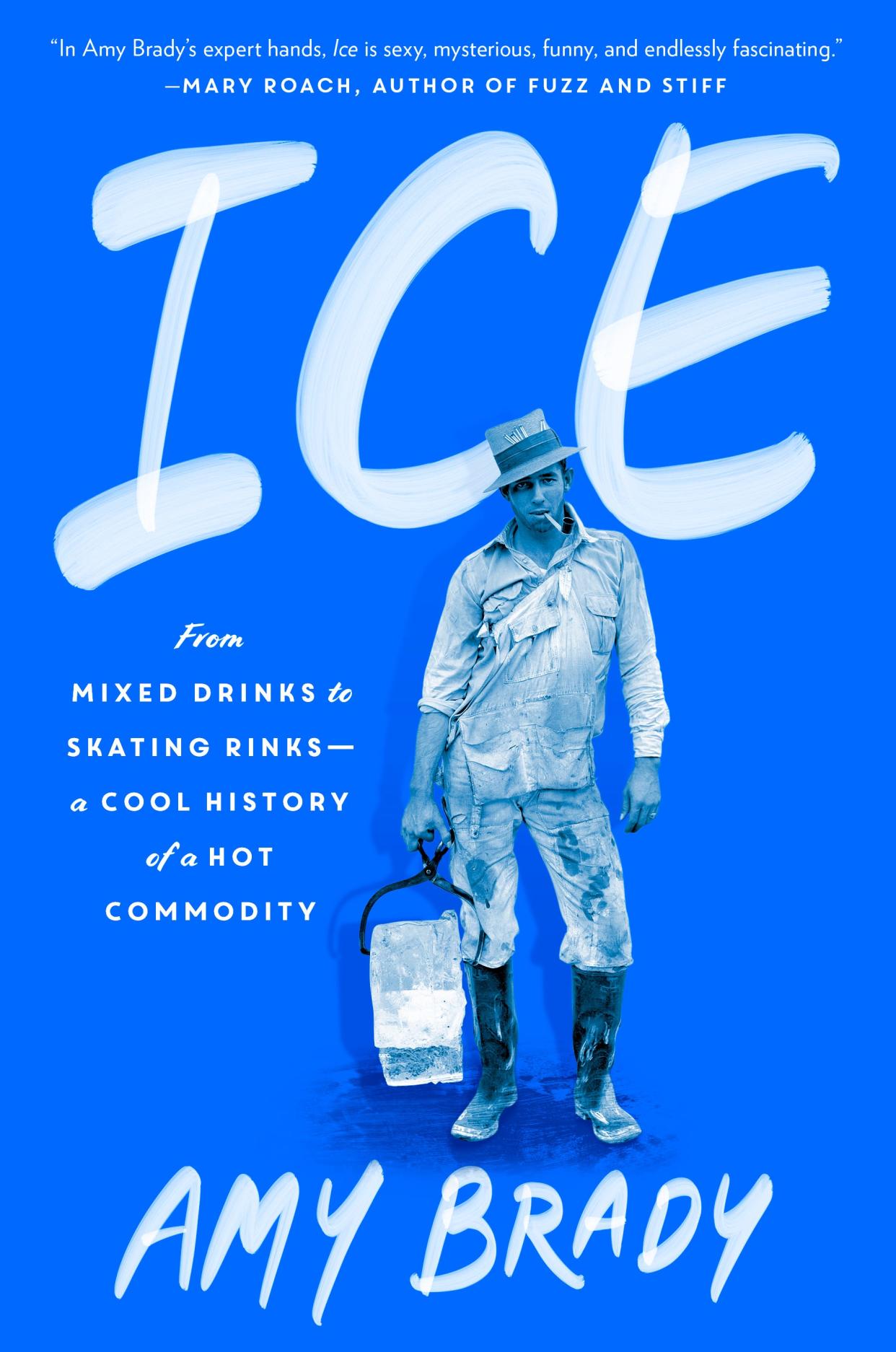Power outage during Topeka West graduate's visit home inspires book about history of ice

Her presence in Topeka during a brutal heat wave five years ago helped make Amy Brady want to learn more about ice.
The 1998 Topeka West High School graduate ended up writing a soon-to-be-published book on the topic.
G.P. Putnam's Sons — an imprint for one of the nation's largest publishing houses, Penguin Random House — on June 6 will publish the book, "ICE: From Mixed Drinks to Skating Rinks — A Cool History of a Hot Commodity."
'Sexy, mysterious, funny, and endlessly fascinating'
"Americans think nothing of dropping a few ice cubes into tall glasses of tea to ward off the heat on a hot summer day or pressing them tenderly in a cloth to a child’s bruised or feverish skin," say promotional materials for the book, Brady's first as a solo author. "Ice on-demand has so revolutionized modern life that it’s easy to forget that it wasn’t always this way ... and to consider what aspects of our society just might melt away as the planet warms."
Promotional materials add that the book highlights "the unexpected and unexplored ways that ice has transformed a nation — from the foods Americans eat, to the sports they play, to the way they live today."
The 336-page book has drawn praise from fellow authors.
"In prose as crystalline as a frozen pond, Amy Brady's 'Ice' details the history of this civilization-shaping substance — one that climate change melts faster every day," wrote author Ben Goldfarb. "You’ll never view a freezer, a popsicle, or the Winter Olympics the same way after reading Brady’s delightful ode to an enigmatic, indispensable state of matter.”
"In Amy Brady’s expert hands, ice is sexy, mysterious, funny, and endlessly fascinating," wrote author Mary Roach.
One of Brady's stories tells of how early theaters, which lacked air conditioning, would place a large block of ice in front of a fan to keep customers cool during shows.
When films were very popular, she writes, the fans worked harder and the ice melted more quickly, leading theater critics to call those films "block busters."
Wedding featured performers dressed as Carrie Nation and John Brown

"No joke: At our wedding in Topeka, KS, a friend dressed up as madman abolitionist John Brown and sang Huey Lewis songs while another friend, dressed as hatchet-wielding Carrie Nation, accompanied him on keyboards," Brady wrote in 2018 on Twitter.
Brady is the executive director of the Massachusetts-based, nonprofit environmental magazine Orion.
She co-edited an anthology published last year called "The World As We Knew It: Dispatches From a Changing Climate."
Brady has a bachelor's degree from the University of Kansas, a master's degree from the University of Missouri at Kansas City and a doctorate in literature and American studies from the University of Massachusetts Amherst.
She has made appearances on the BBC, NPR and and PBS, and has won writing and research awards from the National Science Foundation, the Bread Loaf Environmental Writers' Conference and the Library of Congress.
Brady found the topic of her new book to be "at the intersection" of her experience studying and writing about climate change and culture as well as her academic training in literature and American studies, she said.
Brady lives with her husband, Alan Scherstuhl, and their cats, Patterson and Bing.
Amy Brady said Topeka might be the nation's most poetic city
The possibility that Topeka might be this nation's most poetic city was the topic of a piece Brady wrote in 2015 for lithub.com.
She began: "There’s an old joke told among residents of Topeka, Kansas, that goes like this: 'What’s the difference between Topeka and yogurt?' 'Yogurt has an active culture.'"
Nevertheless, Brady wrote, considerable good poetry has come out of Topeka and went on to share four theories as to why.
'Harnessing the ability to cool has warmed our planet'
Brady told The Capital-Journal this week that she was visiting her father and stepmother, Mike and Janet Brady, in 2018 in Topeka when a brutal heatwave left their house temporarily without electrical power.
Amy Brady drove to get ice at a nearby gas station, which was using a generator.
"As I was filling the cup with ice, I thought about how ironic it was that I was driving to get ice to cool down because of a phenomenon (human-caused climate change) that's eliminating ice," she said.
She said her thoughts then shifted to the relationship between between the natural ice already present on this planet and the "ice on-demand" created by humans.
Promotional materials for Brady's book expand upon that.
"A fundamental irony of our obsession with ice is that harnessing the ability to cool has warmed our planet," they say. "The cooling industry (refrigerators, freezers, and air conditioners) accounts for almost 10% of all yearly CO2 emissions."
But there is encouraging news, those materials say.
"Current pioneering work with methane hydrates, or 'flammable ice,' could provide us with a cleaner fuel source that, if successful, could help reduce emissions and buy us time against global warming," they say.
'Ice men' were seen as objects of romantic desire
The cover of Brady's book is adorned by a photo from a Texas archive showing a 1920s "ice man" who worked delivering ice to customers.
"I love that image because it's one of the most recognizable figures of the early 20th century, but it's a figure that doesn't exist anymore," she said.
The ice man was a "hugely popular" part of American culture in the late 1800s and early to mid-1900s, using wagons or vehicles to deliver large blocks of ice to their customers' homes, Brady said.
She said she was surprised to see how many songs were written focusing on ice men as objects of romantic desire.
Brady suggested that was perhaps because ice men actually crossed the threshold into the house while the husband was at work and the wife was home alone. Mailmen and milkmen didn't enter the house.
Chapter goes from Henry David Thoreau to Lucille Ball to Jerry Seinfeld
Brady's book shares stories about the history of ice-on-demand in the U.S., which she writes is “much like the history of America itself: steeped in myth, given shape by acts of defiance, powered by commercial interests, and driven by bold yet deeply flawed men with visions to change the world."
She writes about Frederic Tudor, "the ice king," who made a fortune beginning in the early 1800s by cutting ice from freshwater Massachusetts ponds and shipping it to sell it in places where ice wasn't available.
Tudor's efforts proved particularly popular in southern states, where residents found they had a taste for consuming beverages created "on the rocks," Brady said.
Her book's Chapter 13 says philosopher Henry David Thoreau voiced concern after seeing Tudor's men harvesting ice from a pond and realizing Tudor's customers were consuming ice made using water in which he had bathed.
Brady said that same chapter tells of a 1952 episode of the TV sitcom "I Love Lucy" in which characters Lucy and Ethel buy a used freezer, to the surprise of the other characters, who "can't believe they could have a freezer."
Not many years later, she said, frozen food had become so common that comedian Jerry Seinfeld — whose humor focuses on things people see in their everyday lives — was doing a standup routine about it.
"In less than 30 years, we go from Lucy barely comprehending the thought of having a freezer to Jerry Seinfeld's doing a whole standup routine about frozen food," she said.
How much is 'ICE: From Mixed Drinks to Skating Rinks — A Cool History of a Hot Commodity' and where is it?
Putnam's book will be available in hardcover for $29 online and in bookstores.
A signed, personalized copy can be obtained by pre-ordering it by June 5 from Connecticut-based River Bend Books.
Brady will appear at 7 p.m. July 6 at the Raven Bookstore in downtown Lawrence.
She then plans to appear in September at the Kansas Book Festival in Topeka.
Contact Tim Hrenchir at threnchir@gannett.com or 785-213-5934.
This article originally appeared on Topeka Capital-Journal: Lucille Ball and Jerry Seinfeld among those in Amy Brady's 'ICE' book

